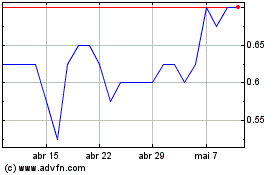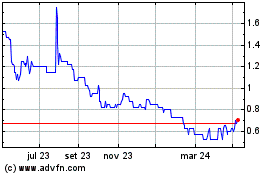TIDMMILA
RNS Number : 2307D
Mila Resources PLC
18 October 2022
Mila Resources Plc / Index: LSE / Epic: MILA / Sector: Natural
Resources
18 October 2022
Mila Resources Plc
('Mila' or the 'Company')
Further drilling down to 450m shows three additional sheared
zones either side of the main mineralised Coffey shear zone
Mila Resources Plc (LSE:MILA), the post-discovery gold
exploration accelerator, is pleased to announce highly encouraging
preliminary visual results from the deepest holes drilled to date
at its Kathleen Valley Gold Project in Western Australia ('Kathleen
Valley' or the 'Project') as part of its ongoing 13,500m
programme.
The two deepest holes so far drilled at Coffey (KVDD0036 and
KVDD0037) have intersected the down dip extension of the
mineralised Coffey shear zone (figure 1) and encountered three
additional sheared zones either side of the main shear zone over an
apparent 87m wide length at 339-426m. This is in addition to the
zone encountered from drilling to 300m (hole KVDD0035) which
intersected a 10m wide zone (from 256.3-266.5M).
Overview
-- Drilling to date has extended the Coffey mineralisation
continuously down dip for 400m and is still open at depth as well
as demonstrating the potential for multiple lodes to be developed
at depth as previously modelled (see figures 3-4).
-- Drill hole KVDD0036 was drilled to a depth of 348.9m and was
stepped out 100m further down dip from KVDD0035, intersecting 9m of
similar alteration bearing sulphide mineralisation and quartz
veining (from 316-325m) as well as a narrow massive sulphide vein
from 346.5-346.6m near the end of the hole (see table 1).
-- Drill hole KVDD0037 was the most successful hole drilled to a
depth of 448.2m, intersecting multiple zones consistent with the
Coffey mineralisation as well as the additional three shear zones
40m north of KVDD0036 and 110m down dip from KVDD0034 on the same
section (see table 1 and figure 2).
-- Significantly, KVDD0037 intersected a broad zone comprising
four sheared zones over an apparent 87m wide down hole length
(339-426m) which, if each zone is mineralised with gold-silver,
would be a significant breakthrough in the development of the
mineralisation at the Coffey Deposit.
Operations Update
-- Drill hole KVDD0038 is progressing and testing the
mineralisation 60m north of KVDD0037 and 80m down dip of KVRD0030
on the northern-most drill line (figure 2).
-- The core from KVDD0035, KVDD0036 and KVDD0037 has been cut
and received by an independent laboratory in Perth ready for
assaying.
-- Following assay results of stage two drilling campaign, the
team will look at a resource upgrade with the potential to
significantly enhance Kathleen Valley's current JORC compliant
resource for both grade and tonnage.
Neil Hutchison, Technical Director of Mila commented: "Hole
KVDD0037 has the potential to be a game changer for us and to
significantly increase our JORC resource. Due to the continuation
and predictability of the mineralised Coffey Shear Zone, we were
sufficiently confident to undertake large step outs with the aim of
rapidly increasing the potential of the project. This has paid off,
as we intersected the Coffey Shear at its projected position 100
and 110m away from our previous drilling, with KVDD0037
encountering multiple zones of alteration, sulphide mineralisation,
brecciation and extensive quartz veining. All of these features are
consistent with the gold-silver bearing zones already assayed and
carrying significant mineralisation higher up in the system."
"Mila's geologists started seeing the signs of additional lodes
in the previous drilling and geological modelling supported this
concept. Hole KVDD0037 is the first real test of the concept and
has delivered four structurally deformed zones which could all be
potentially mineralised, within a broad area extending over an
apparent width of 87m. We remain extremely excited about the
potential for Coffey Deposit to grow significantly in size as we
await our assay results and begin building our JORC resource
model."
Mark Stephenson, Executive Chairman of Mila commented: "These
visual results are very encouraging and seeing continuity of the
ore body and the system opening at depth puts us in a very
confident position moving forward. Following the completion of
stage 2 step out holes and the return of the lab assay results, the
team will look at taking the opportunity to make a substantial
upgrade to the current JORC resource.
"Having recently raised GBP696,000 we will look at conducting
parallel work streams to complement the drilling campaign,
including detailed structural geological review and first phase
metallurgical work to progress Coffey towards
commercialisation.
"I am also particularly impressed with our ground team, who have
developed a strong relationship with the traditional landowners
through communication and operating responsibly, as well as having
developed the knowledge and confidence to take a broad step out
during this stage 2 drilling campaign. This work has allowed us to
get onto the ground quickly and effectively, accelerating our
development strategy dramatically. Both factors are key to the
development of the Kathleen Valley Project which we will look at
building upon in the future."
F igure 1: Core from KVDD0037 (347.5-354.6m shown) displaying
altered and sulphide bearing rocks typical of the main ductile
shear zone which carries the Au-Ag mineralisation at the Coffey
Deposit.
Table 1: Visual description of potentially mineralised zones in
drill holes KVDD0036 & KVDD037.
Hole From To Length Description
ID (m) (m) (m)
Main alteration, sulphide, and veined
KVDD0036 316.0 325.0 9.0 shear zone
------ ------ ------- --------------------------------------
328.2 328.5 0.3 Sulphide and chlorite veined zone
------ ------ ------- --------------------------------------
346.5 346.6 0.1 Massive sulphide vein
------ ------ ------- --------------------------------------
Upper alteration and veined shear
KVDD0037 338.9 341.9 3.0 zone
------ ------ ------- --------------------------------------
Main Coffey shear alteration and
348.1 365.0 16.9 sulphide zone
------ ------ ------- --------------------------------------
365.0 373.0 8.0 Weakly veined and altered zone
------ ------ ------- --------------------------------------
Extensive veining zone with weak
373.0 402.0 29.0 alteration
------ ------ ------- --------------------------------------
Semi-massive sulphides and alteration
402.0 403.0 1.0 zone
------ ------ ------- --------------------------------------
412.0 414.0 2.0 Alteration and quartz breccia zone
------ ------ ------- --------------------------------------
414.0 426.0 12.0 Moderate veining & alteration bands
------ ------ ------- --------------------------------------
In relation to the disclosure of visual mineralisation, the
Company cautions that visual estimates should never be considered a
proxy or substitute for laboratory analysis. Laboratory assay
results are required to determine the widths and grade of
mineralisation. The Company will update the market when laboratory
analytical results become available.
Further Information
In addition to the recent results from diamond core hole KVDD035
which intersected a 10.2m wide ductile shear zone comprising of
bleached, silicified and variably sulphide mineralised (pyrrhotite
& chalcopyrite) basaltic rocks, drilling at Coffey continues to
deliver excellent results with holes KVDD0036 and KVDD0037 both
intersecting broad zones consistent with the Au-Ag bearing zones
previously reported from the Coffey Deposit (Figure 2).
KVDD0036 was drilled to a depth of 348.9m and was stepped out
100m further down dip from KVDD0035 (Figure 3), intersecting 9m of
similar alteration bearing sulphide mineralisation and quartz
veining (from 316-325m) as well as a two narrow sulphide veined
zones below the main shear zone (Table 1 and see photos in Appendix
1).
The deepest hole of the drill program KVDD0037 (448.2m) was the
most successful hole drilled to date, intersecting multiple zones
consistent with the Coffey mineralisation 40m north of KVDD0036 and
110m down dip from KVDD0034 on the same section (Figure 2 and
Figure 4).
Significantly, KVDD0037 intersected an apparent broad 87.1m wide
zone (338.9-426.0m down hole length) comprising four structurally
deformed zones of heavily sheared and altered rocks containing
sulphide mineralisation, semi-massive and vein sulphides
(pyrrhotite and chalcopyrite) as well as extensively quartz veined
and altered basalt zones (see Figure 1 and Appendix 1 for photos).
This style of deformation is consistent with the higher-grade
gold-silver mineralised zones previously reported. These zones
cannot be determined to be carrying gold-silver until the assays
are returned from the laboratory; however, the considerable
structural change in the rocks within KVDD0037 has the potential to
be a significant breakthrough in the development of the
mineralisation at the Coffey Deposit at depth.
Importantly these new intersections extend the Coffey shear zone
mineralisation continuously down dip for 350-400m and is still open
at depth. Hole KVDD0037 demonstrates the potential for multiple
wide lodes to be developed at depth as previously modelled and are
now visually evident. Hole KVDD0038 is in progress and will be
testing the mineralisation 60m north of KVDD0037 and 80m down dip
of KVRD0030 on the northern most drill line (Figure 2).
The samples from holes KVDD035-0037 have been cut, sampled, and
sent to a commercial laboratory in Perth for assay analysis and
will be reported to the market when they are available.
During Mila's three drilling campaigns, the Company is seeing
the potential of the Coffey Au-Ag Deposit. Coffey has grown
significantly in size, width and grade compared to the initial pre
drilling resource. The Company is awaiting the assay results from
this recent drilling program to enable it to begin building its
JORC resource model. The Company is optimistic that it will be able
to upgrade its JORC Resource for Coffey next year.
Figure 2: Drill collar plan showing RC drill holes (grey),
Diamond drill hole (blue) and current hole (magenta). The existing
JORC resource zone is shown (red) with the new mineralisation
extension zone (green) which will be included in the upgraded JORC
resource estimations. Gold intersection bars are shown in red.
Figure 3: Cross Section showing the current JORC Resource zone
limits and the newly defined mineralisation as a result of Mila's
drilling. Intersection of the Coffey Shear zone mineralisation in
the recently completed stepout holes KVDD0035 & KVDD0036 are
shown, extending the mineralisation over 350m down dip, 250m beyond
the resource zone and is open at depth.
Figure 4: Cross Section showing the current JORC Resource zone
limits and the newly defined mineralisation as a result of Mila's
drilling. Intersection of the Coffey Shear zone mineralisation in
the recently completed stepout hole KVDD0037 is shown, extending
the mineralisation over 400m down dip, 300m beyond the resource
zone and is open & widening at depth.
**ENDS**
For more information visit www.milaresources.com or contact:
Mark Stephenson info@milaresources.com
Mila Resources Plc
Jonathan Evans
Tavira Financial +44 (0) 20 7100 5100
Nick Emerson
SI Capital +44 (0) 20 3143 0600
Susie Geliher and Max Bennett
St Brides Partners Limited +44 (0) 20 7236 1177
This information is provided by RNS, the news service of the
London Stock Exchange. RNS is approved by the Financial Conduct
Authority to act as a Primary Information Provider in the United
Kingdom. Terms and conditions relating to the use and distribution
of this information may apply. For further information, please
contact rns@lseg.com or visit www.rns.com.
RNS may use your IP address to confirm compliance with the terms
and conditions, to analyse how you engage with the information
contained in this communication, and to share such analysis on an
anonymised basis with others as part of our commercial services.
For further information about how RNS and the London Stock Exchange
use the personal data you provide us, please see our Privacy
Policy.
END
DRLFIFSEIVLTLIF
(END) Dow Jones Newswires
October 18, 2022 02:00 ET (06:00 GMT)
Mila Resources (LSE:MILA)
Gráfico Histórico do Ativo
De Dez 2024 até Jan 2025

Mila Resources (LSE:MILA)
Gráfico Histórico do Ativo
De Jan 2024 até Jan 2025
